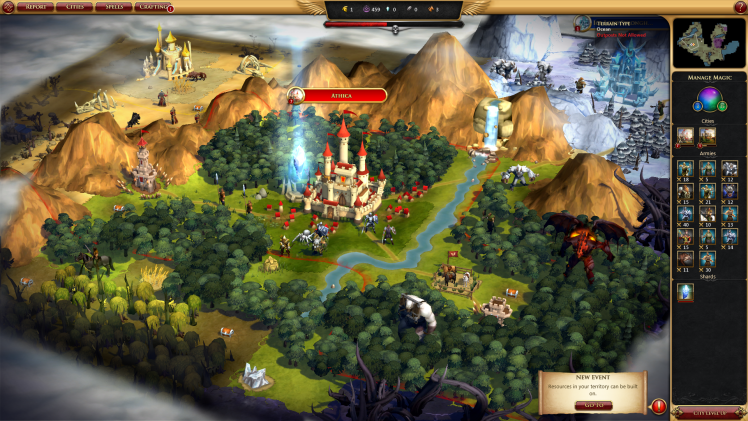You’ll recruit new champions along the way, either by saving them, picking them up as part of quests, or by receiving them from allies. Each has a distinct skillset that dramatically changes gameplay. Your archer might set tiles on fire that kill enemies later who run through them; your magician might freeze every enemy on the board for a turn that doesn’t resist his spell. And so on.
The skills vary widely even on a single champion, and no two feel exactly alike.
What you won’t like
The thin, slapdash campaign
Perhaps it has something to do my with strategy in strategy games – somewhat plodding, brute-force development of the strongest units, which I then use to crush opposing enemy forces –- but the campaign in Sorcerer King, while long, added little interest to the game. GamesBeat held our review to be certain that we had the opportunity to fully test the campaign, which wasn’t available until launch.
It feels, as with other Stardock strategy games – we’re looking at you, Galactic Civilizations – the campaign was the last thing to be completed and the aspect of the game that earned the least love. Too few quests propelled the action: For a long stretch, my only quest was to defeat the Sorcerer King. While a worthy goal, wasn’t that just the objective of any randomly generated game here?
Other campaign quests popped up as part of the map exploration, but they seemed mostly designed to spur additional exploration of other parts of the map, and it was hard to see where they had a significant impact on the game, or its battles, or even told a compelling story.
The occasionally repetitive enemy lineups
At far too many times in Sorcerer King, I would engage a collection of enemies, stomp them, go to engage another pack – and have to double-check to make sure I wasn’t just re-doing the last battle. Same units, arranged in the same formation, with the same abilities – only minor differences convinced me that I was in a legitimate battle and not suffering a bug.
Even packs of enemies at opposite ends of the map will sometimes follow predictable patterns, and in a game like this one, where that map changes with each playthrough, that’s unacceptable. Yes, I enjoy the battles, but not enough to do exactly the same groups over and over again.
Flavorless factions
Ally factions will help you in your battle against your evil nemesis, and they typically don’t like you much, creating colorful and entertaining dialog options.
Unfortunately, they won’t add much fun or challenge to the gameplay. Choosing the “correct” option when dealing with a potential ally rarely forces you to make difficult sacrifices. They don’t offer you much except materials, units, or champions (if you’re lucky) to fight with.
Whether you woo them or not feels like it matters little to your overall success.
Dull, tedious city management
Cities offer no way to queue construction, so while they at least remember how far along you were in crafting a unit or a building if you change your mind and then return to it later, you still have to manually begin each new piece of construction when the last finishes.
It does aid you by running through the rotation of idle units, idle cities, and so on before giving you the Turn option. Still, there’s just too much of a “What now?” feeling when a city asks you yet again for guidance, especially if you have sovereign abilities active that reduce summons to as little as three turns.
Cities’ production can be gradually slow thanks to thralls of the bad guy, and you’ll need to place outposts in areas that have materials your city needs to construct certain units. I wish I could say those complications felt more like challenges than annoyances.
Conclusion
Sorcerer King offers a nice strategic balance, and the feeling of carving a swath through a landscape already dominated by your enemy gives the game a fun, challenging feel. Galactic Civilizations may be a more-polished Stardock strategy title, but Sorcerer King offers more enjoyment and certainly a lot more humor.
Avoid the cheap campaign and go straight to the business of winning back the world from the evil king. The combination of challenging combat and crystal defense will force you to both attack and retreat, and the doomsday counter adds urgency to your play.
Forgive the occasional battle repetition, annoyingly hands-on cities, and the milquetoast faction system. You’ll still find dozens of hours of enjoyment just proving that you can win, despite the odds, on a playing field that tips deliberately uneven.
Score: 85/100
Sorcerer King is now out for PC. Stardock provided GamesBeat with a download code for this review.
VentureBeat's mission is to be a digital town square for technical decision-makers to gain knowledge about transformative enterprise technology and transact. Learn More






